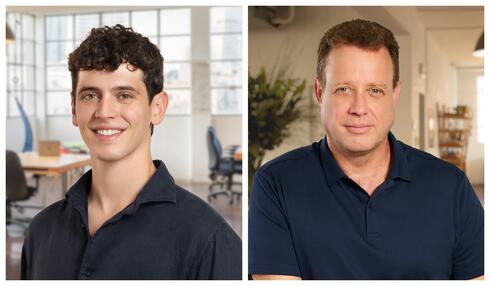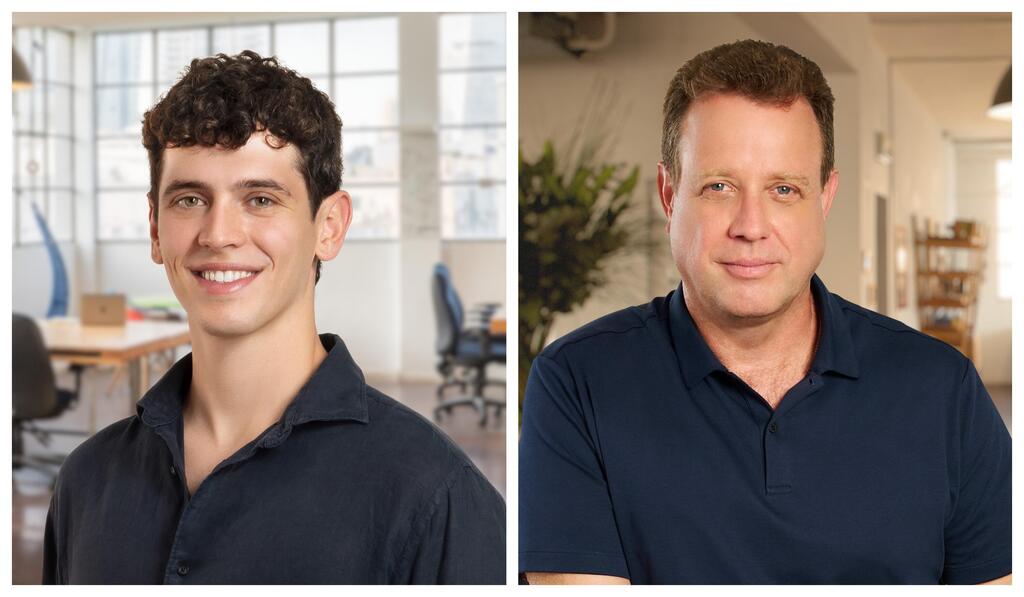
2024 VC Survey
“The painful events of the past year are indeed also a potential springboard for 2024.”
Avichay Nissenbaum and Roy Katzenelson from lool Ventures have joined CTech to share insights into the current state of the VC ecosystem in Israel.
“2023 was a difficult year yet I do not see it as a ‘lost one’,” said lool Ventures’ Roy Katzenelson. “Israel has endured many struggles over 12 months, yet the tech ecosystem has prevailed through all the hardships with some outstanding companies starting their journeys. The painful events of the past year are indeed also a potential springboard for 2024, I believe we will see more foreign investors coming back to invest in Israel, and a lot more funding activity taking place.”
The VC has joined CTech for its 2024 VC Survey series to share what it thinks lies ahead for Startup Nation. “We assume that the war shall continue at a certain lower intensity throughout 2024, but regardless the economy shall rebound back to a ‘new normal’,” added Avichay Nissenbaum. “There is still a risk of a war in the north, but we hope that the conflict will be resolved politically. Regardless, our advice to founders is to focus on cash efficiency to achieve more with less.”
VC fund ID
Name of the fund: lool Ventures
Total assets: $200m
Leading partners: Avichay Nissenbaum, Yaniv Golan
Selected portfolio companies: Beewise, Flip, Eleos Health, NoTraffic
From your perspective, was 2023 a ‘lost year’, or can the events that happened during it be seen as a springboard for opportunities in 2024?
Roy Katzenelson: 2023 was a difficult year yet I do not see it as a ‘lost one’. Israel has endured many struggles over 12 months, yet the tech ecosystem has prevailed through all the hardships with some outstanding companies starting their journeys. The painful events of the past year are indeed also a potential springboard for 2024, I believe we will see more foreign investors coming back to invest in Israel, and a lot more funding activity taking place.
What do you believe is more crucial to the state of Israeli tech: the influence of global processes and the global economy, or the local events ranging from the political protest to the war state?
Katzenelson: One can’t coexist without the other, while global macro processes will impact Israeli tech, the local events can carry a lot of weight on how the Israeli market is reacting to those macro changes. The magnitude of macro events on the local ecosystem is determined by local events, they are the ones dictating whether the macro events have an exponential impact or are contained.
Has the prestige of Israeli high-tech been damaged, or are the protests and the war merely a 'small bump in the road' from which the sector can recover within months?
Katzenelson: The prestige has not been impacted. The resilience (in the truest and deepest sense of the word) that the Israeli tech ecosystem demonstrated since October 7th has strengthened the brand of Israeli tech. Having said that, the war and the protests highlighted the risks to the Israeli ecosystem and pushed foreign investors to be more proactive in mitigating them at the time of investment.
How much effort was required of you to maintain the fund's status with your investors in 2023? What were their primary concerns and how did you address them?
Avichay Nissenbaum: We maintain constant and fluent communication with our investors regularly, especially now during times of crisis. Nevertheless, we were overwhelmed with the supporting messages from our investors, both in Israel and abroad, showing their empathy, support, and willingness to be helpful
How are you preparing for the most pessimistic scenarios, such as the continuation of the war in Gaza deep into 2024, the opening of another front in the north, or further reduction of government support for high-tech?
Nissenbaum: We assume that the war shall continue at a certain lower intensity throughout 2024, but regardless the economy shall rebound back to a “new normal”. There is still a risk of a war in the north, but we hope that the conflict will be resolved politically. Regardless, our advice to founders is to focus on cash efficiency to achieve more with less.
Did you raise fund money in 2023 for an existing fund or a new one? What are your expectations regarding this matter for 2024?
Nissenbaum: We are investing from our third fund, and have lots of dry powder to invest in new companies, so we are very active. In fact, we were also very active last year and even issued two term sheets in November and December of 2023. We are certain a new wave of innovation and growth is coming as Israel comes out of this current crisis, and it will be stronger than ever.
How many investments did you make in 2023, and how does it compare to 2022?
Katzenelson: We made five investments in 2023, in various sectors and types of companies. This is about the same pace as we had in 2022. We have been just as active and bullish on the Israeli ecosystem in the past few months. We back this statement with our investment activity with some exciting unannounced investments we’ve made since 7/10.
In your view, will the amounts and/or the number of deals in 2024 be more like those of 2023 or 2021-22?
Katzenelson: Round amounts will be closer to 2023 levels, we don’t expect to see the inflated 2021/2 pricing returning in the near future.
As for the number of rounds, the answer should be broken into investment round types. On the early stage side - I believe that the number of rounds will remain more or less the same as 2023, founders that are built from the right material are the founders that started their venture in 2023, and the same type of founders are out there now, and will raise in 2024. In terms of later-stage rounds, I believe we will see an increase in a number of rounds. Many later-stage companies stretched their runway for as long as they could to avoid raising flat/down rounds, it seems like 2024 is when push comes to shove and many of these companies will go out there to raise, hence an increase in the number of rounds.
Which high-tech sectors will you focus on in the upcoming year? Which areas will maintain their prominence, and which ones appear less attractive?
Katzenelson: As always, at lool we keep our sector-agnostic approach and believe that the right opportunities are out there and should not be missed due to pre-fixed constraints. An example of a new industry that we’re excited about is the energy space, thanks to strong regulatory tailwinds, including a massive Inflation Reduction Act, the opportunities there are endless. Additionally, we are seeing interesting evolution in the AI space where founders are starting to focus more on how to become enablers of growth rather than building application-layer solutions.
Related articles:
Which type of companies stand a better chance of garnering increased attention from VC funds this year - early-stage or advanced rounds?
Katzenelson: Both benefit from the same opening conditions, the real question is how to allocate the right attention to the right investors. As we have seen during 2023, some of the foreign investors that were very active in the early stage side during 2021/22 shifted to spending more time on the later stage side during 2023. We believe this trend will prevail in 2024 which again makes it a question of where founders spend their time.
What changes will you implement in your approach to evaluating investments in startups in the coming year, compared to the previous two years? What practices will you abandon, and what criteria will you now demand from founders?
Nissenbaum: There is no change in how we judge founders, we believe in bonding, getting to know the founder, and going through a disciplined due diligence process, the days of 2021 where VCs dropped teamsheets left and right are gone, we didn't believe in that approach and did not invest in those market conditions as we felt the economics and the time needed to dig deeper where not there. We believe in a disciplined approach.
Do you think it is likely we will witness encouraging IPOs, the emergence of unicorns, or remarkable exits in 2024?
Katzenelson: We’ve already been witnessing some great news coming from the lool portfolio and we can’t wait to share them.
Practical and current tips for founders planning upcoming money-raising efforts:
- Manage your funnel wisely: As said earlier, it’s not just about talking to investors, it’s about talking to the RIGHT investors. Make sure you are not wasting your time and efforts on investors who are not as active given the situation, focusing on later/earlier stages (opportunistic investments are less likely in this market), and that you are telling the right story.
- Underpromise and over-deliver: When thinking about round size and how much to raise - think about what your next round is going to look like. Raising too much capital is one of the biggest learnings of 2021/2 - companies found themselves overfunded and did not hit milestones. A lean and mean approach can go a long way and getting to where you need with just enough capital keeps you focused on the goal
- Come prepared: A few months ago we issued an updated version of our ‘Fundraising Playbook’, a 60-page eBook (and a few limited edition physical copies) with practical tips and notes on how to raise your funding round. Read that and prep as much as you can before you go out to fundraise.
Name two portfolio companies that you think will thrive in 2024:
Flip
Sector + description of the product/service: Social commerce - The Flip app is the next generation of shopping apps; creators make honest product reviews that customers can directly purchase from.
Investment amount + total: lool Ventures invested $2.5 million, $239 million to date
Founders + year of establishment: Noor Agha and Jonathan Elman, 2019
Reasoning why this is their year:
Flip just raised a massive $144million C round now valued at over $1B, and they are poised as a rival of TikTok.
When we first met the Flip founding team, we were immediately struck by the uniqueness of their vision and approach to transforming social commerce. CEO Noor Agha presented a future of e-commerce that was innovative, compelling and attentive to human nature. His partnership with Jonathan Elman, his Israeli co-founder, underscored a harmonious blend of creativity and strategic thinking. Flip's blueprint for reimagining social commerce—a platform that seamlessly integrates community and shopping in a way that creates immense value for both shoppers and brands —stood out as not only ambitious but achievable. Their commitment to rebuilding the social commerce ecosystem from the ground up, with a focus on unparalleled user experience and technological innovation, convinced us that Flip was poised to redefine the marketplace. Joining them on this journey wasn’t just an investment; it was a partnership in shaping the future of how we shop, share, and connect.
Beewise
Sector + description of the product: AgTech - Beewise is building a fully autonomous beehome thus creating a paradigm shift in the way beehives are operated. By doing so Beewise is not only saving the bees but in fact increasing yields of the fields and doing all of that while keeping operational costs at a minimum.
Investment amount: $118m to date
Founders + year of establishment: Saar Safra, Boaz Petersil, Yossi Sorin, Eliyah Radzyner
Reasoning why this is their year:
With machine manufacturing getting to scale, Beewise is positioned to break out this year and get to the coverage they have been gearing for. With improved models hitting the field at record pace, we believe Beewise will have a noteworthy year.













